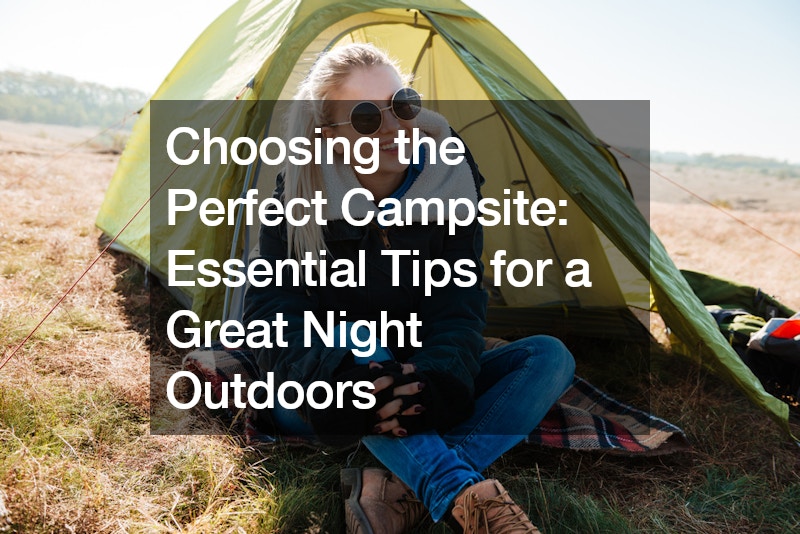A successful camping trip hinges on many factors, but none quite as important as choosing the perfect campsite. A well-selected location can elevate your experience from a night of restless sleep to a cozy haven under the stars. This guide equips you with the knowledge to find the ideal spot, ensuring a comfortable and safe night in the embrace of nature.
Leave No Trace: A Camper’s Responsibility
The wilderness thrives on a delicate balance. As a responsible camper, it’s crucial to minimize your impact.
Whenever possible, utilize established campsites. These designated areas have already borne the brunt of use, and choosing them lessens the overall footprint left behind.
If established campsites aren’t available, prioritize creating a small, inconspicuous spot. Aim to leave the environment as pristine as you found it. Steer clear of areas with fragile vegetation or signs of wear and tear. By following these principles, you ensure minimal disruption to the ecosystem and preserve the beauty of the wilderness for future campers.
Location: Selecting the Ideal Spot
Finding a flat, comfortable patch of ground might seem like the only priority, but a perfect campsite offers more than just a level surface. Here are key considerations to elevate your campsite selection:
Drainage is Key: A soggy tent is a recipe for discomfort. Look for campsites with porous ground that allows rainwater to seep through instead of pooling around your tent. When setting up your tent, orient it in a way that channels water away to avoid unwanted puddles.
Water: A Necessary Ally
Easy access to water is vital for cooking, cleaning, and hydration. However, striking a balance is crucial. While a refreshing stream nearby sounds ideal, setting up camp too close (less than 200 feet) can contaminate the water source. Finding a happy medium between convenience and responsible water usage is key.
Nature’s Thermostat: Staying Warm Throughout the Night
As the sun dips below the horizon, temperatures tend to plummet. Seek shelter for your campsite in areas with some tree cover. Trees act as a natural insulator, reflecting heat radiating from the ground back towards your tent, keeping you warm and cozy throughout the night. This trapped heat also helps reduce condensation build-up inside your tent.
Safety First: Avoiding Natural Hazards
A campsite should be a place of tranquility, not a potential danger zone. Avoid areas with dead trees or loose rocks that could fall and cause harm. If you’re camping in mountainous terrain, steer clear of locations prone to rockfalls or avalanches.
Wind Warriors: Finding Refuge from the Elements
A blustery night can disrupt even the most peaceful sleep. To combat this, choose a campsite with a natural windbreak. Look for areas shielded by boulders, large trees, or even the leeward side of a hill. These barriers will significantly reduce the wind’s impact, ensuring a restful night.
Cooler air tends to settle in low-lying areas like valleys or dips in the terrain. Opt for a slightly uphill location to avoid this phenomenon and enjoy the benefit of warmer air. Similarly, exposed ridges and open meadows offer little protection from wind and storms. Seek shelter in more sheltered areas for a comfortable night’s sleep.
Preparing Your Haven: Setting Up Camp
Once you’ve identified the perfect campsite, it’s time to prepare your home away from home. Clear away any loose rocks, sticks, or pinecones that could damage your tent or become uncomfortable companions for the night. A quick sweep ensures a smooth tent floor and a more enjoyable camping experience.
Beyond the Basics: Enhancing Your Campsite
While the tips above focus on the essential aspects of campsite selection, there are additional considerations to elevate your comfort level.
- Sunsets and Sunrises: If you’re an early riser or a sunset enthusiast, consider the position of the sun in relation to your campsite. Choosing a campsite with a view of the sunrise or sunset can add a touch of magic to your camping experience.
- Scenic Vistas: Breathtaking views can significantly enhance your camping trip. Look for campsites that offer panoramic vistas of mountains, lakes, or other natural wonders. Soak in the beauty of the surroundings and create lasting memories.
- Privacy and Noise Levels: If peace and quiet are paramount, choose a campsite away from high-traffic areas or loud natural features like rushing rivers.
Camping Etiquette: Sharing the Wilderness Responsibly
Respect for fellow campers is essential. Be mindful of noise levels, especially during late hours and early mornings. Choose a campsite that offers a reasonable distance from other campers to ensure everyone enjoys a peaceful night.
Conclusion: A Perfect Pitch for a Memorable Night
By following these essential tips, you’ll be well on your way to selecting the perfect campsite. A well-chosen location translates to a comfortable night’s sleep, protection from the elements, and a heightened appreciation for the beauty of the outdoors. Remember, camping is about connecting with nature, so take a moment to appreciate the sights, sounds, and smells of your surroundings. Leave no trace, minimize your impact, and embrace the unique experience that each campsite offers. With a little planning and these helpful pointers, your next camping adventure is sure to be a night to remember under the vast canvas of the night sky.
.

